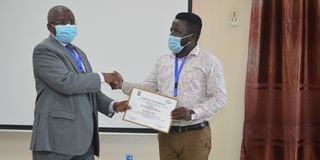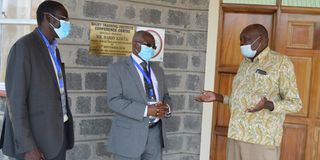Breaking: Autopsy reveals how Cyrus Jirongo died
Premium
Egerton University to set up modern call centre to boost food security

Egerton University Acting Vice-Chancellor Prof Isaac Kibwage (left) hands over a certificate to Dr Dickson Okello during the Egerton University Centre of Excellence in Sustainable Agriculture and Agribusiness Management workshop in Naivasha on June 28, 2021.
Egerton University will set up an ultra-modern call centre to link up farmers with experts who will help them boost food production.
The institution has a pool of experts who conduct research on animal, plants and agribusiness practices at the Njoro-based campus.
Egerton University Acting Vice-Chancellor Prof Isaac Kibwage said that the setting up of the call centre is one of the efforts by the institution to help smallholder farmers and other stakeholders benefit from the expertise of the researchers.
“The researchers at Egerton University are perhaps the best local experts in plant and animal production and we want the farmers and other stakeholders along the value chain to utilise their expertise to boost their production,” said Prof Kibwage.
He was speaking at Dairy Training Institute (DTI) In Naivasha on Thursday during the Egerton University Centre of Excellence in Sustainable Agriculture and Agribusiness Management (Cesaam) Theses dissemination workshop.
Research work
The workshop is one of the efforts by Cesaam project of getting back key stakeholders recommendations and best practices derived from the results of students’ research work.

Egerton University Acting VC Isaac Kibwage (centre), Team Leader of the Egerton University Centre of Excellence in Sustainable Agriculture and Agribusiness Management Prof George Owuor (left) listen to John Magut at Dairy Training Institute in Naivasha on June 28, 2021.
“The workshop is aimed at bringing out emerging issues and solutions of the same along agricultural value chains,” said Prof Kibwage.
The stakeholders during the four-day workshop included representatives of smallholder farmers from whom data was sourced, government extension officers from the region of data collection, non-governmental organisations, industry players, academic advisors and policy makers.
Prof Kibwage observed that the mission of Cesaam is to strengthen local capacity for conducting rigorous agricultural research, innovation and outreach as a means to achieving sustainable food security across the sub-saharan region.
“These disseminations under Cesaam are geared towards giving back stakeholders such as smallholder farmers who provide data, extension officers, policy makers and development partners the results of the research carried out and to share good practices and recommendations for consideration by the stakeholders with the objective of boosting food and nutritional security and for policy adjustments,” said the VC.
Smallholder farmers
He lauded the Cesaam team led by Prof George Owuor for ensuring that students’ feedback results of their research, particularly to smallholder farmers is relayed back to the farmers.
“This is a strong instrument for dialogue towards sustainable agricultural and agribusiness and I commend the World Bank through the government of Kenya for supporting centres of excellence such as Cesaam which gives young graduates to become innovators, consultants and experts” said the VC.
He noted that Cesaam has made a great contribution to research work and so far over 240 students-168 masters and 72 PhDs from 11 countries including Kenya, Rwanda, Burundi, Uganda, Tanzania, South Sudan, Malawi, Ghana, Botswana, Lesotho and Ethiopia have benefited from the exchange programme.
“The university is proud to continue in this mode raising funds for sustainability during these difficult times,” said Prof Kibwage.





